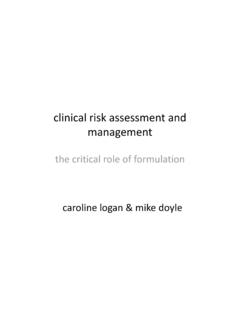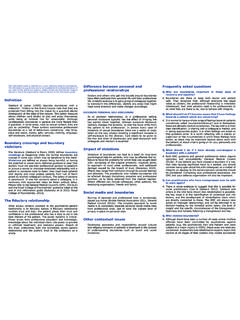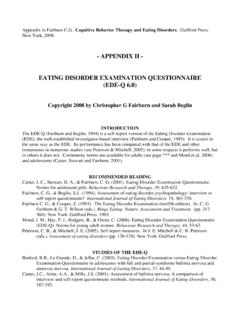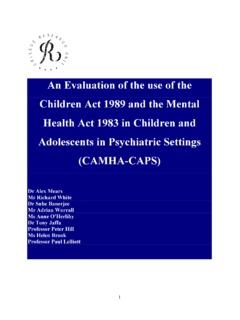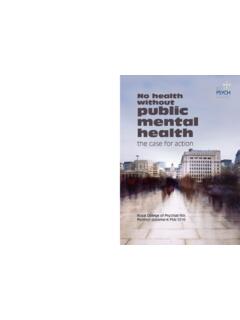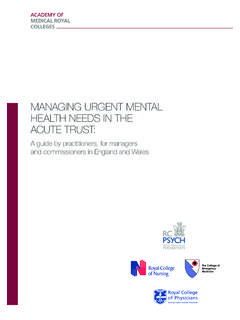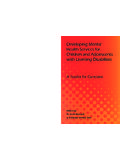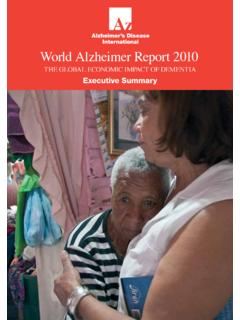Transcription of Dementia training for hospital staff - Royal College of ...
1 Dementia training for hospital staff Creating an informed and effective acute care workforce About us alzheimer 's Society is the UK's leading support and research charity for people with Dementia and those who care for them. There are 750,000. people with Dementia in the UK with numbers set to rise to one million by 2021. Our vision is of a radically improved world for people with Dementia . A world where they can fully contribute to family and community life with dignity, free from discrimination. A world where they, and those who live with and care for them, have their needs fully met.
2 A world, ultimately, where Dementia can be defeated. alzheimer 's Society is the Dementia care training specialist for the health sector. About your reputation for Dementia care Improving the patient experience The Royal College of Nursing (2011) report The Operating Framework for the NHS. in England 2012/13' and local commissioners are likely to be developing Dignity in Dementia ; transforming general CQUINs in your local area on improving hospital care' included a survey of people alzheimer 's Society wants to work with you to with Dementia and carers.
3 This found that Dementia care. 98% of respondents felt that staff having The CQUIN payment framework is also address the issues facing those responsible for the a poor understanding of Dementia was a being recognised as important for the barrier to the provision of good quality care. implementation of NICE quality standards. care of people with Dementia in hospitals. Ensuring your workforce has the appropriate alzheimer 's Society training courses directly link to the NICE Dementia clinical knowledge and skills to care for people Our training solutions will equip staff with the with Dementia will help improve the guideline 42 and can empower your staff to recognise and respond appropriately to patient experience and enable the provision knowledge and skills to better engage with patients of high quality, person-centred care.
4 People with Dementia . This will contribute to your organisation being able to meet with Dementia , improving the experience of a stay Commissioning for Quality and Innovation (CQUIN). local and national CQUIN targets, including the third national CQUIN goal on improving diagnosis of Dementia in in hospital for those living with the condition. Dementia is highlighted as an area hospitals. requiring particular attention in Dementia care in hospitals Other bene ts commonly associated with the provision of quality Dementia training in hospitals include: Reducing the length of stay in support patients living with the disease enhanced reputation for the provision of quality Dementia care hospital for people with Dementia to leave hospital earlier.
5 Reduction of anxiety and fear for patients with Dementia People with Dementia over the age of 65 Improving dignity for patients reduction in falls currently occupy up to a quarter of hospital with Dementia beds at one time. An unacceptable variation reduction in the use of anti-psychotic medication Between March and June 2011 the Care in the provision of Dementia care on general reduction in dehydration and malnutrition in patients with Dementia Quality Commission (CQC) inspected 100. wards in England, Wales and Northern NHS hospitals, focusing on nutrition and improved discharge procedures Ireland has led to a call to focus on the dignity for older people in their care.
6 Quality of Dementia care in hospitals. improved staff engagement with patients While good practice was observed and In general, patients with Dementia tend to identi ed poor practice was also identi ed, improved staff con dence in caring for patients with Dementia , reduction stay longer in hospital than patients including privacy and dignity not being without Dementia . For the patient this has respected and patients not being given the in stress and sickness absence an impact on Dementia symptoms, assistance they needed to eat (CQC 2011).
7 Time saving ef ciencies achieved through better understanding of physical health and well-being. For the Crucially, both staff and patients told the patients' needs NHS there is an inevitable cost implication. CQC that there were not always enough By creating a workforce who understand staff with the right training on duty to creation of a Dementia friendly environment Dementia and are equipped to respond spend time giving care and staff reduction in complaints. appropriately to the needs of people with themselves stated that they had little Dementia in their care, you will help training in Dementia (CQC 2011).
8 Dementia care in hospitals into contact with people with Dementia . life care, communication and behaviour. This includes healthcare assistants, porters, Specialist Dementia training hospital staff will enable participants to alzheimer 's Society specialist trainers develop the necessary skills to provide housekeepers and receptionists. The Royal College of Psychiatrists Report enhanced care for patients with Dementia . All training is delivered by nurses who are For quali ed staff , practice development of the National Audit of Dementia Care in We will equip staff with knowledge and registered with the NMC, holding an active leads, nursing staff and allied professionals General Hospitals 2011 highlights that skills to take back to their workplace, as PIN.
9 And have experience of working we offer a more comprehensive programme awareness and understanding of Dementia well as the con dence to bring about within the acute setting with older delivered over two workshop days. Self in frontline staff is a priority for both a change to practice in Dementia care in patients. Additionally, all trainers are directed study and project work can be patients and carers. Only 32% of staff said hospitals. registered with the Institute for Learning, incorporated into this programme, in which that they had suf cient training in which supports professional development Learning outcomes staff are asked to identify an area for Dementia care and the majority agreed and excellence in order to deliver the best improvement within their own work setting.
10 That further training would be bene cial We deliver training on a variety of topics, possible training experience to participants. Following the workshop days there is a and would improve the level of care suitable for staff working at all levels within 12 week project period during which Our trainers are all members of the received by people with Dementia ( Royal the hospital . As training is always tailored participants identify an area for improvement alzheimer 's Society Associate Trainer College of Psychiatrists 2011).
